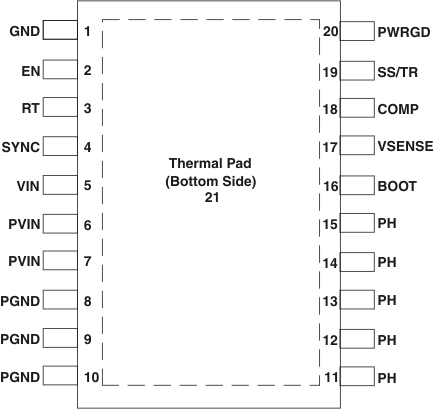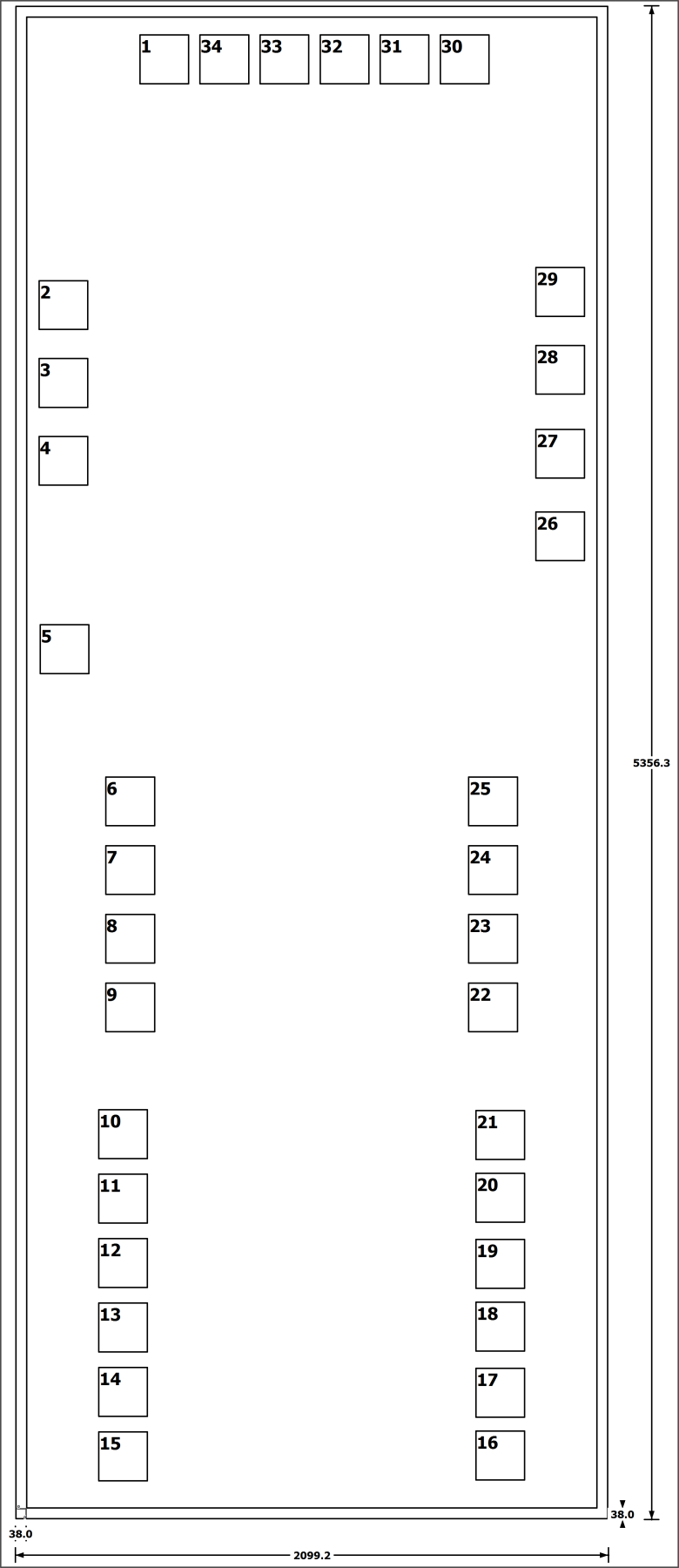ZHCSEM8 January 2016 TPS50601-SP
PRODUCTION DATA.
- 1 特性
- 2 应用
- 3 说明
- 4 修订历史记录
- 5 说明 (续)
- 6 Pin Configuration and Functions
- 7 Specifications
-
8 Detailed Description
- 8.1 Overview
- 8.2 Functional Block Diagram
- 8.3
Feature Description
- 8.3.1 VIN and Power VIN Pins (VIN and PVIN)
- 8.3.2 PVIN vs Frequency
- 8.3.3 Voltage Reference
- 8.3.4 Adjusting the Output Voltage
- 8.3.5 Maximum Duty Cycle Limit
- 8.3.6 PVIN vs Frequency
- 8.3.7 Safe Start-Up into Prebiased Outputs
- 8.3.8 Error Amplifier
- 8.3.9 Slope Compensation
- 8.3.10 Enable and Adjust UVLO
- 8.3.11 Adjustable Switching Frequency and Synchronization (SYNC)
- 8.3.12 Slow Start (SS/TR)
- 8.3.13 Power Good (PWRGD)
- 8.3.14 Bootstrap Voltage (BOOT) and Low Dropout Operation
- 8.3.15 Sequencing (SS/TR)
- 8.3.16 Output Overvoltage Protection (OVP)
- 8.3.17 Overcurrent Protection
- 8.3.18 TPS50601-SP Thermal Shutdown
- 8.3.19 Turn-On Behavior
- 8.3.20 Small Signal Model for Loop Response
- 8.3.21 Simple Small Signal Model for Peak Current Mode Control
- 8.3.22 Small Signal Model for Frequency Compensation
- 8.4 Device Functional Modes
-
9 Application and Implementation
- 9.1 Application Information
- 9.2
Typical Application
- 9.2.1 Design Requirements
- 9.2.2
Detailed Design Procedure
- 9.2.2.1 Operating Frequency
- 9.2.2.2 Output Inductor Selection
- 9.2.2.3 Output Capacitor Selection
- 9.2.2.4 Input Capacitor Selection
- 9.2.2.5 Slow Start Capacitor Selection
- 9.2.2.6 Bootstrap Capacitor Selection
- 9.2.2.7 Undervoltage Lockout (UVLO) Set Point
- 9.2.2.8 Output Voltage Feedback Resistor Selection
- 9.2.2.9 Compensation Component Selection
- 9.2.3 Application Curve
- 10Power Supply Recommendations
- 11Layout
- 12器件和文档支持
- 13机械、封装和可订购信息
6 Pin Configuration and Functions
HKH Package
20-Pin CFP
Bottom View

Pin Functions
| PIN | DESCRIPTION | |
|---|---|---|
| NO. | NAME | |
| 1 | GND | Return for control circuitry/thermal pad(1) |
| 2 | EN | EN pin has an internal pullup thus EN pin can be floated to enable the device. As an option external pullup can also be added if desired. Adjust the input undervoltage lockout (UVLO) with two resistors. |
| 3 | RT | In internal oscillation mode, a resistor is connected between the RT pin and GND to set the switching frequency. |
| 4 | SYNC | Optional 1-MHz external system clock input. The device operates with an internal oscillator if this pin is left open. |
| 5 | VIN | Supplies the power to the output FET controllers |
| 6 | PVIN | Power input. Supplies the power switches of the power converter |
| 7 | ||
| 8 | PGND | Return for low-side power MOSFET |
| 9 | ||
| 10 | ||
| 11 | PH | Switch node |
| 12 | ||
| 13 | ||
| 14 | ||
| 15 | ||
| 16 | BOOT | A bootstrap capacitor is required between BOOT and PH. The voltage on this capacitor carries the gate drive voltage for the high-side MOSFET. |
| 17 | VSENSE | Inverting input of the gm error amplifier |
| 18 | COMP | Error amplifier output and input to the output switch current comparator. Connect frequency compensation to this pin. |
| 19 | SS/TR | Slow-start and tracking. An external capacitor connected to this pin sets the internal voltage reference rise time. The voltage on this pin overrides the internal reference. It can be used for tracking and sequencing. |
| 20 | PWRGD | Power Good fault pin is an open-drain connection. Power Good fault pin. Asserts low if output voltage is low due to thermal shutdown, dropout, overvoltage, or EN shutdown, or during slow start. |
(1) Thermal pad (analog ground) must be connected to PGND external to the package.
Bare Die Information
| DIE THICKNESS | BACKSIDE FINISH | BACKSIDE POTENTIAL | BOND PAD METALLIZATION COMPOSITION | BOND PAD THICKNESS |
|---|---|---|---|---|
| 15 mils. | Silicon with backgrind | Ground | Al5TiN | 557.5 nm |

Bond Pad Coordinates in Microns
| DESCRIPTION | PAD NUMBER | X MIN | Y MIN | X MAX | Y MAX |
|---|---|---|---|---|---|
| GND | 1 | 400.77 | 5039.325 | 578.07 | 5216.625 |
| EN | 2 | 44.19 | 4169.79 | 221.49 | 4347.09 |
| RT | 3 | 44.19 | 3894.21 | 221.49 | 4071.51 |
| SYNC | 4 | 44.19 | 3618.63 | 221.49 | 3795.93 |
| VIN | 5 | 47.565 | 2952.27 | 224.865 | 3129.57 |
| PVIN | 6 | 280.215 | 2414.115 | 457.515 | 2591.415 |
| PVIN | 7 | 280.215 | 2170.665 | 457.515 | 2347.965 |
| PVIN | 8 | 280.215 | 1928.115 | 457.515 | 2105.415 |
| PVIN | 9 | 280.215 | 1684.665 | 457.515 | 1861.965 |
| PGND | 10 | 254.52 | 1236.285 | 431.82 | 1413.585 |
| PGND | 11 | 254.52 | 1008.315 | 431.82 | 1185.615 |
| PGND | 12 | 254.52 | 780.345 | 431.82 | 957.645 |
| PGND | 13 | 254.52 | 552.375 | 431.82 | 729.675 |
| PGND | 14 | 254.52 | 324.405 | 431.82 | 501.705 |
| PGND | 15 | 254.52 | 96.435 | 431.82 | 273.735 |
| PH | 16 | 1590.12 | 99.405 | 1767.42 | 276.705 |
| PH | 17 | 1590.12 | 321.435 | 1767.42 | 498.735 |
| PH | 18 | 1590.12 | 555.345 | 1767.42 | 732.645 |
| PH | 19 | 1590.12 | 777.375 | 1767.42 | 954.675 |
| PH | 20 | 1590.12 | 1011.285 | 1767.42 | 1188.585 |
| PH | 21 | 1590.12 | 1233.315 | 1767.42 | 1410.615 |
| PH | 22 | 1564.335 | 1684.665 | 1741.635 | 1861.965 |
| PH | 23 | 1564.335 | 1928.115 | 1741.635 | 2105.415 |
| PH | 24 | 1564.335 | 2170.665 | 1741.635 | 2347.965 |
| PH | 25 | 1564.335 | 2414.115 | 1741.635 | 2591.415 |
| BOOT | 26 | 1801.71 | 3352.14 | 1979.01 | 3529.44 |
| VSENSE | 27 | 1801.71 | 3644.145 | 1979.01 | 3821.445 |
| COMP | 28 | 1801.71 | 3940.92 | 1979.01 | 4118.22 |
| SS/TR | 29 | 1801.71 | 4216.5 | 1979.01 | 4393.8 |
| PWRGD | 30 | 1463.67 | 5039.325 | 1640.97 | 5216.625 |
| GND | 31 | 1251.09 | 5039.325 | 1428.39 | 5216.625 |
| GND | 32 | 1038.51 | 5039.325 | 1215.81 | 5216.625 |
| GND | 33 | 825.93 | 5039.325 | 1003.23 | 5216.625 |
| GND | 34 | 613.35 | 5039.325 | 790.65 | 5216.6 |